
Analiza krize francuskog franka
Extract from the issue 1/1938 of the journal Znanost i život
More...We kindly inform you that, as long as the subject affiliation of our 300.000+ articles is in progress, you might get unsufficient or no results on your third level or second level search. In this case, please broaden your search criteria.

Extract from the issue 1/1938 of the journal Znanost i život
More...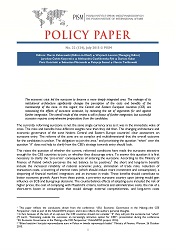
The Paris Climate Conference to be held in December may be the last chance to deliver a globalagreement on tackling climate change. One issue that could be a game-changer for the negotiationsand one that is inevitable to achieve global climate goals is so-called climate finance. The existingframework does not provide enough predictability and capacity to limit global warming to a maximumof 2°C. A clear mechanism for gathering public funds from developed countries and the inclusion ofprivate investments is needed to secure reliable post-2020 climate actions.
More...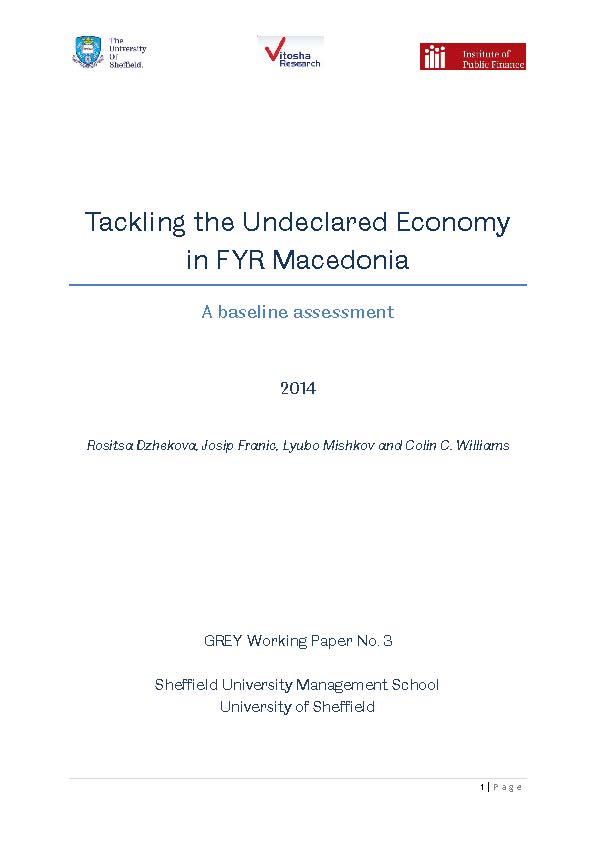
This working paper is an output of the European Commission’s FP7 "Marie Curie Industry-Academia Partnerships and Pathways" (IAPP) project entitled "GREY - Out of the shadows: developing capacities and capabilities for tackling undeclared work in Bulgaria, Croatia and FYR Macedonia". Ms Rositsa Dzhekova and Mr. Lyubo Mishkov, Center for the Study of Democracy, and Prof. Colin C. Williams and Mr. Josip Franic, GREY-IAPP, Sheffield University Management School, University of Sheffield elaborated the report in July 2014. This report provides a detailed review of available evidence on the extent and nature of the undeclared economy in the Former Yugoslav Republic of Macedonia (FYROM), as well as on the institutional actors involved in tackling the phenomenon and their policy approach and measures used.
More...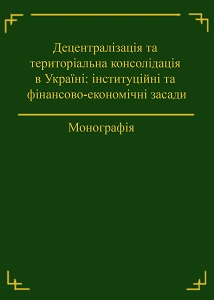
In the article the mechanism of tax certificates, allowing time to replenish the local budget through property taxation, to encourage taxpayers to tax compliance, promote investment and improve the liquidity of tangible assets in the region. Proved tax certificate has considerable potential for the formation of additional revenues of local budgets in Ukraine.
More...
Confirmed by their economic nature income tax is a form of payment for public services provided by local government in the territory. Income tax in Ukraine is the main financial resource for local governments. In terms of decentralization of public administration in Ukraine continues to implement the centralization of budgetary resources from income tax for individuals in need as soon as possible solutions.
More...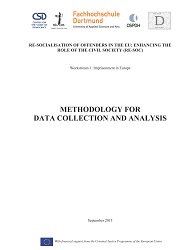
The successful implementation of the activities under the recently launched initiative Re-socialization of offenders in the EU: enhancing the role of the civil society (RE-SOC) depends on the expanded knowledge of the prison systems in the participating countries. Therefore, a separate set of activities is dedicated to the collection, analysis and systematization of the available information and tailoring it to the specificities of the other initiative activities. To facilitate this process a Methodology for data collection and analysis was developed, which includes the following components: (1) list of issues to be covered; (2) recommended sources to be consulted and relevant international standards; (3) methodological guidelines on how to collect, analyze and present information; (4) glossary of terms; and (5) language and style requirements. The developed methodology will be used for analyzing the information collected for several EU Member States. The analysis will aim to answer specific questions related to the prison system: structure and legal framework of the penitentiary system, prison capacity, number and structure of the prison population, etc. The results of the analysis will be summarized in country background papers.
More...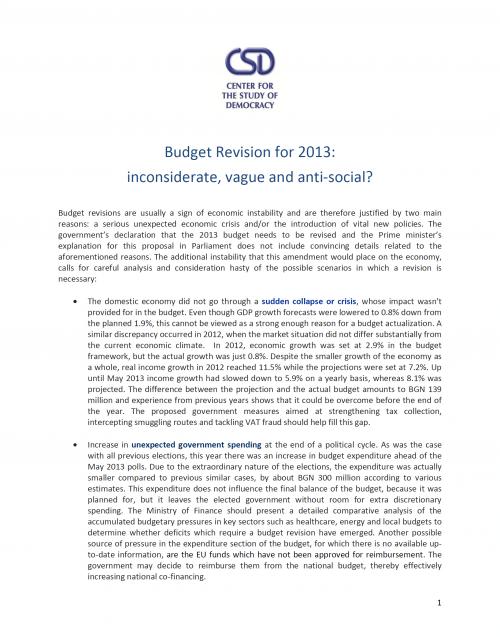
Budget revisions are usually a sign of economic instability and are therefore justified by two main reasons: a serious unexpected economic crisis and/or the introduction of vital new policies. The government’s declaration that the 2013 budget needs to be revised and the Prime minister’s explanation for this proposal in Parliament does not include convincing details related to the aforementioned reasons. The additional instability that this amendment would place on the economy, calls for careful analysis and consideration hasty of the possible scenarios in which a revision is necessary.
More...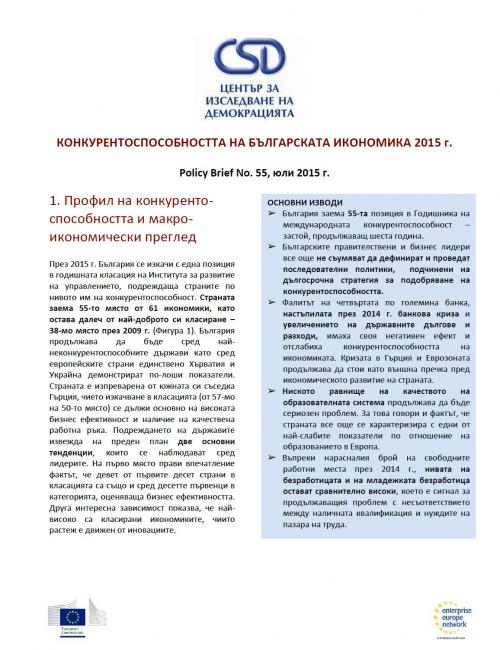
In 2015 Bulgaria has regained one position compared to the previous year in the economic competitiveness ranking of the World Competitiveness Yearbook (WCY), published by the Institute for Management Development (IMD). The country is ranked 55th out of 61 economies. This is only a marginal improvement and remains significantly lower compared to its highest achievement in 2009 – 38th place. The ranking highlights two particular commonalities among the best ranking countries. Firstly, nine countries from the top 10 are also listed in the top 10 of the business efficiency factor. And secondly, all top positions are occupied by economies which are driven by innovation-based growth. In the policy brief the Center for the Study of Democracy provides the following recommendations for increasing the competitiveness of the Bulgarian economy: • Tackle high level corruption and state capture; • Modernize public administration and strengthen independent regulators; • Adopt education for innovation-based growth; • Tackle energy poverty, energy intensity and supply dependency; • Improve the country’s branding.
More...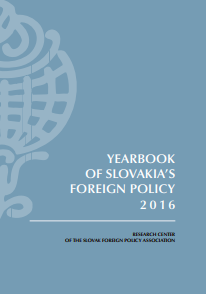
Slovakia combines a high energy dependence with high energy intensity and relies on energy imports, mostly from Russia. However, in recent years this Central European country has made progress in terms of building interconnections in the gas sector, and market coupling in the power sector. Diversification is now possible for gas as well as oil supplies. Slovakia now faces a different challenge: to preserve its role as a gas transit country, and to resume its role as an electricity exporter. As the spectre of Nord Stream 2 looms over Slovakia, the country is looking for opportunities to offset the negative effects of the offshore project. The transmission system operator Eustream, owned by the government at 51 per cent, is seeking new business opportunities. It has been successful in transporting increased volumes of gas to Ukraine, thanks to the reverse flow. It has been much less successful, however, in selling its new pipeline project, Eastring, to Romania, and in pursuing an interconnection with Poland, an LNG import country. In the meantime, both Eustream and the Slovak government seem to be approaching a compromise with Moscow, which will allow Slovakia to continue transporting Russian gas westwards despite Nord Stream2. It was Poland, however, who made the game-changing decision on the project of Gazprom and its Western partners. The Polish competition authority effectively suspended the joint consortium, complicating the operational and financial prospects of the project.
More...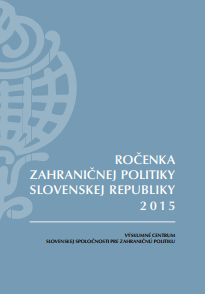
Rok 2015 bol v Európskej únii poznačený krízami. Bolo ich hneď niekoľko naraz – menová, migračná, kríza solidarity, integračná kríza – a počas celého roka vytvárali nestabilné politické prostredie, v rámci ktorého členské štáty vrátane Slovenska museli pôsobiť. V tomto kontexte a pod tlakom okolností sa postoje členských štátov značne rôznili. V roku 2015 možno v prípade Slovenska hovoriť o zvýšenej asertivite krajiny v otázkach európskej politiky. V rámci takmer dvanásťročného pôsobenia ako členská krajina Slovensko nikdy nezohrávalo takú výraznú rolu vo formovaní opozície voči európskym iniciatívam. Išlo najmä o migračnú krízu, v rétorickej rovine to bola aj kritika reštriktívnych opatrení EÚ voči Rusku. Pri nemenej dôležitej situácii s hroziacim bankrotom Grécka a možnosťou jeho vystúpenia z eurozóny Slovensko zastávalo jedno z najstriktnejších stanovísk, tentoraz však v súlade s postojmi väčšiny členských štátov.
More...
Rok 2015 mal byť znova o Grécku, ale nakoniec ekonomika pripravila aj iné prekvapenia. Od prvého januára 2015 získala eurozóna 19. člena – Litva sa napriek čoraz vlažnejšej podpore eura medzi obyvateľmi akýmsi samospádom do eurozóny dostala. Oveľa väčšie napätie však bolo cítiť v súvislosti so zmenou počtu členov smerom dole.
More...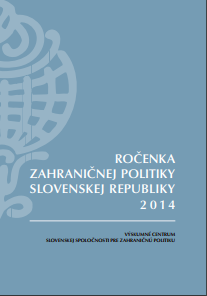
Udalosti v Kyjeve, na Kryme, v Donbase a prepad cien ropy v roku 2014 spôsobili globálne problémy, ktorých následky si možno len domýšľať. Finančný kolaps Ukrajiny sa zdá byť nevyhnutný. Pár mesiacov po bombastickej zimnej olympiáde v Soči (ktorá stála toľko čo všetky zimné olympiády dokopy) sme svedkami rovnako bombastické- ho spľasnutia „uhľovodíkovej“ bubliny, ktorá má potenciál stiahnuť nielen Rusko, ale aj Venezuelu, Nigériu či ťažobné sektory vo vyspelých krajinách. Problémy Európy s jej percentami HDP hore-dolu okolo národných deficitov sa aspoň načas zdali byť detskou hrou. Napriek tomu všetkému však na záver roka 2014 vývoj v Grécku a Európe pripomenul rok 2010 a jej vlastné vnútorné starosti. Už bezmála zabudnuté témy sa vrátili ako bumerang. Pritom rok 2014 už vyzeral takmer ako rok zmeny k lepšiemu, aspoň čo sa (nielen) dlhovej krízy týka.
More...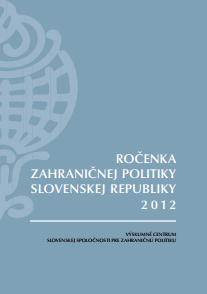
V septembri 2012 sa v médiách pripomínalo výročie krízy aj na politickej úrovni. Štyri roky predtým skrachovala štvrtá najväčšia investičná banka v USA Lehman Brothers, nasledoval prudký prepad ekonomiky v západnom svete, záchrany viacerých bánk a v roku 2010 dopadla kríza naplno aj na verejný sektor. Grécko muselo požiadať o pomoc po tom, ako vyšli najavo jeho zahmlievané deficity. Pol roka nato nasledovalo Portugalsko a Írsko.
More...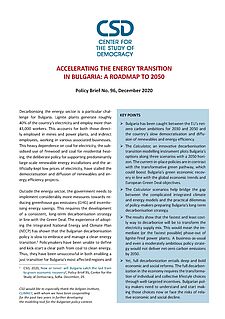
Bulgaria has been caught between the EU’s net-zero carbon ambitions for 2030 and 2050 and the country’s slow democratisation and diffusion of renewables and energy efficiency. To develop effective policy measures, the Bulgarian government needs to draw evidence-based consistent decarbonisation pathways for each economic sector with annual targets for continuous monitoring. This is especially true considering that there is so far little connection between the government’s own strategic documents (i.e., the 2030 National Development Programme, the National Recovery and Resilience Plan and the National Energy and Climate Plan) and the EU’s long-term objectives for a low-carbon transition. This Policy Brief plots Bulgaria’s options along three scenarios with a 2050 horizon using an innovative decarbonisation transition modelling instrument, called The Calculator. It helps bridge the gap between the complicated integrated climate and energy models and the practical dilemmas of policy-makers preparing Bulgaria’s long-term decarbonisation strategy.
More...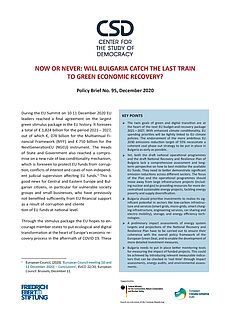
The twin goals of green and digital transition are at the heart of the next EU budget-and-recovery package 2021-2027. With enhanced climate conditionality, EU spending priorities will be tightly linked to EU climate policies. The endorsement of the more ambitious EU 2030 emissions reduction target of 55% necessitate a coherent coal phase out strategy to be put in place in Bulgaria as early as possible.Yet, both the draft national operational programmes and the draft National Recovery and Resilience Plan of Bulgaria lack a comprehensive assessment and long term perspective on how to best mobilise the available EU funds. They need to better demonstrate significant emission reductions across different sectors. The focus of the Plan and the operational programmes should move away from large infrastructure projects (including nuclear and gas) to providing resources for more decentralised sustainable energy projects, tackling energy poverty and supply diversification.
More...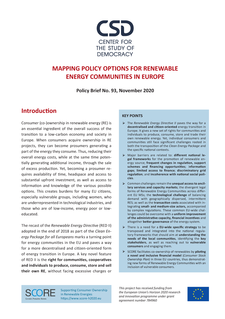
Consumer (co-)ownership in renewable energy (RE) is an essential ingredient of the overall success of the transition to a low-carbon economy and society in Europe. When consumers acquire ownership in RE projects, they can become prosumers generating a part of the energy they consume. Thus, reducing their overall energy costs, while at the same time potentially generating additional income, through the sale of excess production. Yet, becoming a prosumer requires availability of time, headspace and access to substantial up-front investment, as well as access to information and knowledge of the various possible options. This creates burdens for many EU citizens, especially vulnerable groups, including women, who are underrepresented in technological industries, and those who are of low-income, energy poor or low-educated.Based upon the findings and conclusions from recent research on the economic, social, technological and governance enabling conditions and barriers in promoting prosumership and renewable energy communities in Europe, an international team of researchers and practitioners is endeavouring to facilitate the co-ownership in RE. It has done so by piloting a new financial model, the Consumer Stock Ownership Plan, in Italy, the Czech Republic and Germany with numerous European cities following.As a financial instrument, the Consumer Stock Ownership Plan brings several advantages with regard to the set-up of Renewable Energy Communities. It also provides consumers with flexible participation, external financing and long-term loan repayment, thereby encouraging the engagement of low-income households.
More...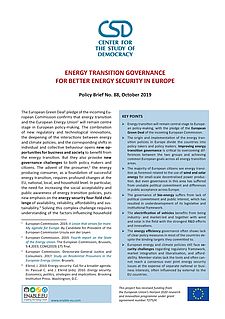
The European Green Deal pledge of the incoming European Commission confirms that energy transition and the European Energy Union will remain centre stage in European policy-making. The combination of new regulatory and technological innovations, the deepening of the interactions between energy and climate policies, and the corresponding shifts in individual and collective behaviour opens new opportunities for business and society to benefit from the energy transition. But they also provoke new governance challenges to both policy makers and citizens. The advent of the prosumer, the energy producing consumer, as a foundation of successful energy transition, requires profound changes at the EU, national, local, and household level. In particular, the need for increasing the social acceptability and public awareness of energy transition policies, puts new emphasis on the energy security four-fold challenge of availability, reliability, affordability and sustainability. Solving this complex challenge requires understanding of the factors influencing household prosumption choices, in the first place. But it also calls for adequate energy transition policy choices and effective tools to steer quickly through the changing energy security landscape.Europe, as a large energy consumer faces different choices from individual member states. Navigating these choices has become more complex and challenging amid continuing environmental challenges, the souring of US – China trade relations and the resurgent Russia confrontation. Consumers have grown more concerned with the rising cost of energy transition, in particular in lower income member states in Central and Eastern Europe. Russia’s strategic political projects in gas supply like Nord Stream 2 and Turkish Stream have divided the European Commission and member states. Similarly, LNG terminals and shale gas development have attracted supporters and opponents, with no common European policy in sight. New nuclear power plants such as Paks II in Hungary, Hinckley Point in the UK, Belene in Bulgaria have underscored the importance of designing and implementing socially inclusive and sustainable policies alongside the economic benefits and energy security.
More...
The twentieth anniversary of Central Europe’s accession to the EU should not only be an occasion to celebrate the region’s economic success, but also to reflect upon the developmental challenges awaiting it. The Central European countries’ membership in the EU has been a great economic success. The pace of economic growth has been relatively high, convergence has progressed, foreign trade has developed, direct investment inflows have continued, and unemployment has fallen to very low levels. Moreover, the countries of the region have managed to maintain their fiscal stability. However, this positive picture is marred by the fact that the convergence process has clearly slowed in many of the region’s countries over recent years, while the EU itself has lost momentum in its growth. In light of the serious threats on the horizon, such as supply chain disruptions, the demographic crisis, and Russia’s aggressive policy towards the West, Central Europe cannot rely solely on its position as a subcontractor to foreign corporations. It should learn from the mistakes made by the EU’s southern states, which at a certain point in their development fell into a trap of structural problems which led to prolonged economic stagnation.In this report the authors analyse the economic position of Central Europe in the EU and the main challenges to its development; they propose actions which could be taken as a region to upgrade the economic model. These recommendations concern the EU’s Multiannual Financial Framework, the Single Market, industrial policy and infrastructural development.
More...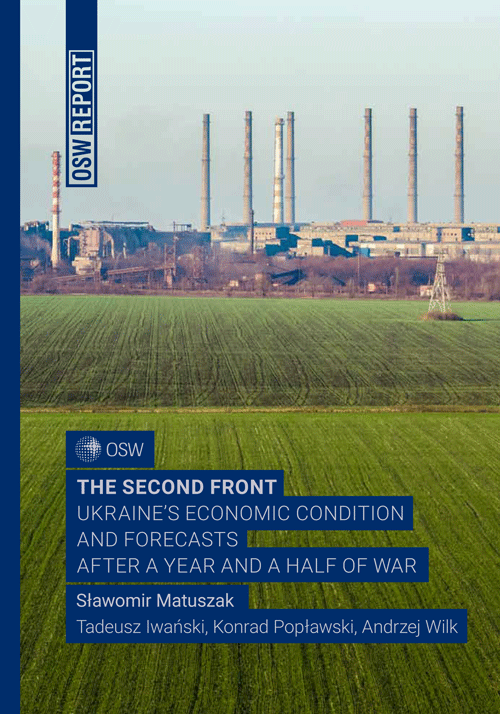
The Russian invasion has caused the largest economic collapse in Ukraine’s history. Its GDP fell by nearly 30% in 2022, although the government has managed to maintain the country’s macroeconomic and financial stability. Although forecasts for this year and next predict economic growth rates of several percent, no significant economic recovery should be expected as long as military operations on the current scale combined with the steady stream of missile attacks continue.
More...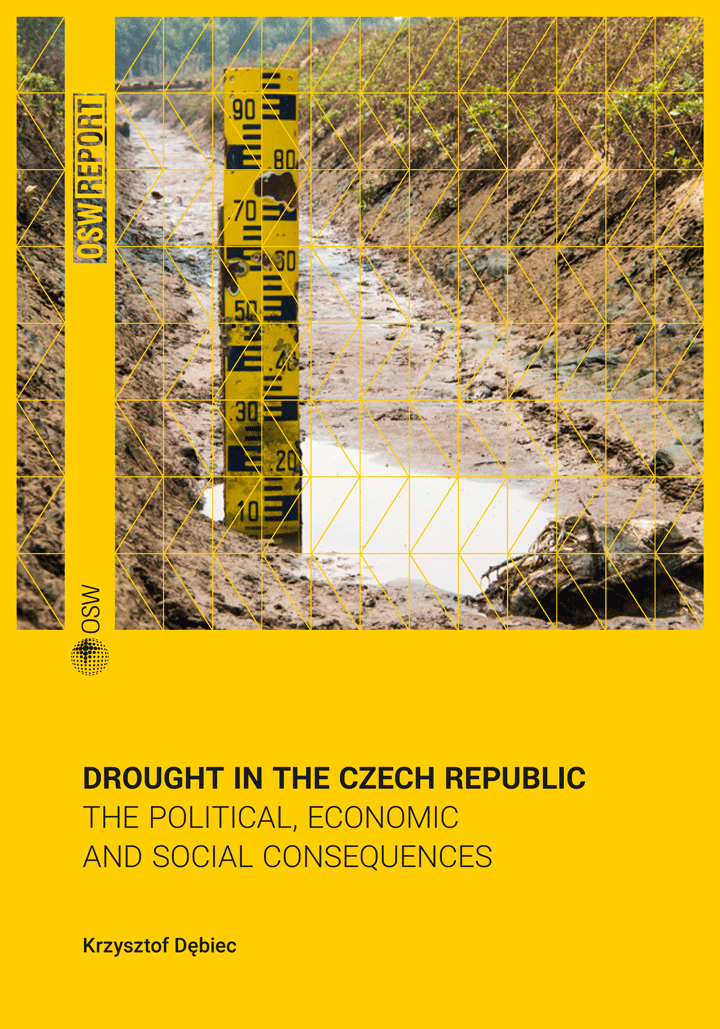
The Czech Republic is an example of a state in which drought has become a key issue in public debate. In the Czech Republic, 2020 was the seventh consecutive year of a drought that is considered the most severe in 500 years, and which differs from the previous ones in that it is more prolonged and is characterised by considerably higher temperatures. At its peak, every fifth municipality was exposed to the risk of water scarcity, which was particularly evident in southern Moravia and in north-western regions. The situation is further complicated by the fact that for many years Prague was focusing on the construction of a flood control system and on the mitigation of the consequences of floods. At present, the Czech Republic has the smallest freshwater resources of all the inland EU member states. Despite a gradual improvement in the situation, recorded since May 2020, the problem involving groundwater scarcity has not been fully eliminated, and experts – taking account of long-term climate change trends and structural problems faced by the Czech agricultural and forestry sectors – are expecting a recurrence of an even more severe drought in a couple of years at the latest. A closer look at the Czech Republic’s struggle with drought may prompt more comprehensive analyses regarding the water management policy pursued in Central Europe, a region which is becoming increasingly affected by recurrent droughts.
More...